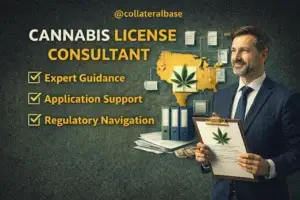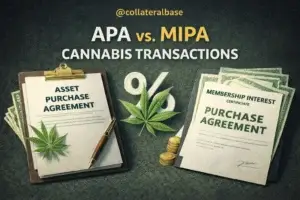How to nail your Nebraska medical cannabis dispensary license application in 2025
In the evolving landscape of Nebraska’s medical cannabis industry, securing a dispensary license represents a pivotal opportunity for entrepreneurs committed to compliant, patient-focused operations. With emergency regulations now in effect as of July 1, 2025, and applications actively being accepted, the path to licensure demands meticulous preparation amid a competitive, merit or lottery-based process. This comprehensive guide explores the Nebraska medical cannabis dispensary license application requirements and deadlines, outlining the steps to open a medical marijuana dispensary in Nebraska while addressing key eligibility criteria, application fees, and documents needed. Whether you’re a local business owner or an investor partnering with Nebraska residents, understanding these nuances can position your venture for success in this regulated market.
Understanding Nebraska’s Medical Cannabis Licensing Framework
 Nebraska’s medical cannabis program, established through voter-approved initiatives in November 2024, prioritizes patient access while enforcing strict regulatory controls. The Nebraska Medical Cannabis Commission oversees all aspects, from cultivation to dispensing, under emergency regulations effective through September 28, 2025, with potential extension. These rules prohibit vertical integration, meaning applicants can hold only one license type—no combining dispensary operations with cultivation or manufacturing.
Nebraska’s medical cannabis program, established through voter-approved initiatives in November 2024, prioritizes patient access while enforcing strict regulatory controls. The Nebraska Medical Cannabis Commission oversees all aspects, from cultivation to dispensing, under emergency regulations effective through September 28, 2025, with potential extension. These rules prohibit vertical integration, meaning applicants can hold only one license type—no combining dispensary operations with cultivation or manufacturing.
For dispensaries specifically, the program limits issuance to one per each of the state’s 12 judicial districts, creating a capped market of just 12 licenses statewide. This geographic restriction underscores the importance of strategic location selection, as districts vary in population density and demand. Dispensaries are authorized to possess, sell, or transfer medical cannabis exclusively to qualified patients or their caregivers, sourcing products solely from licensed Nebraska cultivators, manufacturers, or transporters.
Prohibited product forms include raw plant material, items intended for smoking or vaping, flavored or colored products, and any edibles resembling candy or marketed to minors. Permissible offerings encompass oral tablets, capsules, tinctures, non-sugarcoated gelatinous cubes, gels, oils, creams, suppositories, transdermal patches, and liquids or oils for nebulizers or inhalers—all in tamper-evident, child-resistant packaging.
This framework not only ensures compliance with state statutes but also mitigates risks associated with federal oversight, emphasizing safety, traceability, and community protection.
Eligibility Criteria for Nebraska Dispensary License Applicants
Meeting Nebraska’s stringent eligibility standards is the foundation of a successful application. Applicants must demonstrate financial stability, operational readiness, and adherence to ethical guidelines. Key requirements include:
- Ownership Structure: At least 51 percent of ownership must belong to natural persons who are U.S. citizens and have resided in Nebraska for the preceding four years. This residency mandate supports local economic involvement and aligns with the program’s community-oriented ethos.
- Age and Entity Restrictions: All applicants, officers, directors, or managers must be at least 18 years old. Prohibited entities include government bodies, political subdivisions, or health care practitioners who have issued medical cannabis recommendations within the past five years.
- Criminal History: No applicant, officer, director, or owner may have a felony conviction or controlled substance-related offense within the past 10 years. Prior suspensions or revocations of similar licenses also disqualify candidates.
- Additional Disqualifiers: Entities with disqualified individuals in leadership roles or those failing to meet local approvals will be denied.
These criteria ensure only reputable operators enter the market, fostering trust among patients and regulators alike.
Documents Needed for Nebraska Dispensary License Application
A thorough Nebraska Medical Cannabis License Application package is crucial to avoid denials. Essential documents include:
- Applicant identification: Names, addresses, and residency proofs for all officers, directors, and managers.
- Premises details: Street address or precise description, including ownership information and certification of compliance with local health department and governing board standards.
- Operational plans: Descriptions of land and buildings, proposed medical cannabis products, security measures (including surveillance and access controls), waste disposal protocols, inventory management systems, and quality assurance procedures.
- Background verification: Fingerprint submissions for FBI checks through the Nebraska State Patrol, along with affidavits confirming no disqualifying convictions.
Compiling these materials early allows for refinements, enhancing your application’s merit in the Commission’s evaluation.
Nebraska Medical Cannabis License Application Fees and Timelines
While specific application fees are pending finalization in forthcoming permanent regulations, anticipate costs associated with background checks (such as Nebraska State Patrol fingerprint fees) and potential licensing charges based on similar programs. Licenses, once granted, are valid for two years and non-transferable, requiring renewal to maintain operations.
Timelines are critical in this fast-paced rollout:
- Applications are currently open under emergency regulations.
- The Commission must begin issuing licenses no later than October 1, 2025.
- A public hearing on permanent rules is scheduled for September, with formal adoption expected shortly thereafter.
Submitting promptly maximizes your chances, as the merit-based process favors well-prepared applicants in this limited-opportunity environment.
Steps to Open a Medical Marijuana Dispensary in Nebraska
Navigating the application process requires a strategic, step-by-step approach. Here’s how to proceed:
- Assess Eligibility and Form Your Team: Verify residency, ownership, and background compliance. Partner with Nebraska residents if needed to meet the 51 percent threshold, and consult experts in regulated industries for operational planning.
- Select and Secure a Compliant Location: Identify a site within your targeted judicial district, ensuring it’s at least 1,000 feet from schools, childcare centers, churches, or hospitals. Obtain local approvals from health departments and governing boards early to avoid delays.
- Prepare Comprehensive Documentation: Develop detailed plans for security, inventory, product sourcing, and quality control. Emphasize how your dispensary will serve patient needs while upholding regulatory standards.
- Submit Your Application: Forward the complete package to the Nebraska Medical Cannabis Commission. Be prepared for potential hearings where you may need to defend your proposal.
- Await Review and Address Feedback: The Commission evaluates applications on merit, considering factors like community impact, financial viability, and compliance readiness. Denials may occur for good cause, such as incomplete submissions or violations.
- Launch Operations Post-Approval: Upon licensure, implement traceability systems, source products from in-state licensees, and restrict sales to verified patients or caregivers.
By following these steps, you can streamline your journey toward opening a compliant dispensary.
Considerations for Nebraska Medical Marijuana License Evaluation
While the Nebraska Medical Cannabis Commission’s evaluation process under current emergency regulations appears to involve a review of applications based on compliance with specified criteria—such as eligibility standards, operational plans, and regulatory alignment—it is essential to approach this with caution. The regulations do not explicitly outline a scoring system or competitive merit framework, and there remains uncertainty about how licenses will be awarded, particularly in scenarios with multiple applicants for the limited slots (one per judicial district).
It is possible that the process could evolve into a lottery system in forthcoming regulatory updates like in other states, or other unforeseen mechanisms could be introduced. Premature assumptions about a merit-based approach may lead to unnecessary expenditures on detailed preparations, potential legal challenges if expectations are unmet, or delays that could hinder program implementation. Some observers suggest that ambiguities in the rollout might reflect administrative reluctance to fully launch the program, underscoring the need for applicants to monitor updates closely and consult experts to mitigate risks.
To enhance your application’s strength under the existing framework, consider emphasizing elements that demonstrate readiness and compliance, such as:
- Robust financial projections and verifiable funding sources to ensure operational viability.
- Comprehensive security and inventory protocols designed to prevent diversion and maintain traceability.
- Positive community impacts, including job creation in underserved districts and contributions to local economies.
- Dedication to patient education and the distribution of safe, compliant products.
It is advisable to avoid common errors on you Nebraska medical cannabis dispensary license application, such as proposing prohibited product forms or neglecting local zoning and approval requirements, which could result in denial. Given the evolving nature of the regulations, prioritize flexibility in your planning to adapt to any shifts, including a potential lottery, and seek professional guidance to avoid costly missteps.
Expert Insights for Navigating Nebraska Judicial District Limits for Cannabis Dispensaries
With only one dispensary allowed per judicial district, competition is fierce—particularly in populous areas like District 4 (Omaha). Focus on districts with high patient demand but lower entry barriers, leveraging data on qualifying conditions to forecast market potential. Our experience at Collateral Base reveals that applications emphasizing merit through detailed operational blueprints achieve higher success rates, often exceeding 90 percent in similar markets.
Conclusion: Position Your Business for Success in Nebraska’s Emerging Market
Applying for a Nebraska medical cannabis dispensary license in 2025 demands precision, foresight, and expertise to overcome regulatory hurdles and secure one of the limited slots. By adhering to eligibility requirements, assembling thorough documentation, and crafting a merit-driven proposal, you can capitalize on this groundbreaking opportunity. At Collateral Base, we specialize in license and operations consulting, helping clients navigate complex processes with tailored strategies that drive results. Contact us today to refine your application and ensure your venture thrives in Nebraska’s medical cannabis landscape.
Frequently Asked Questions (FAQ) for Nebraska Medical Cannabis Dispensary Licensing
This FAQ compiles key details from the emergency regulations effective as of July 1, 2025, and the underlying Medical Cannabis Regulation Act. It addresses fundamental aspects of the application process, eligibility, documentation, timelines, and operational considerations. Note that these are based on current provisions, which may be subject to change with permanent regulations expected after a public hearing in September 2025.
1. What are the basic eligibility requirements for a Nebraska medical cannabis dispensary license?
Applicants must be at least 18 years old and ensure that at least 51 percent of ownership is held by U.S. citizens who have resided in Nebraska for the preceding four years. Disqualifications include felony convictions or controlled substance-related offenses within the past 10 years, prior license suspensions or revocations, or involvement by government entities or certain health care practitioners. Entities with disqualified officers, directors, or owners are also ineligible.
The emergency regulations, effective through September 28, 2025, are subject to change with permanent rules expected after a September 2025 public hearing. While the current framework clearly sets the age at 18 for dispensary ownership eligibility, it’s prudent to monitor updates, as permanent regulations could introduce a higher age threshold (e.g., 21) to align with other states or address administrative concerns.
2. How many dispensary licenses are available, and are there geographic restrictions?
Only one dispensary license may be issued per each of Nebraska’s 12 judicial districts, resulting in a statewide cap of 12 licenses. Locations must be at least 1,000 feet from schools, childcare centers, churches, or hospitals. Vertical integration is prohibited, meaning a licensee cannot hold multiple types of cannabis business licenses (e.g., no combining dispensary with cultivation).
3. What documents are needed for a Nebraska dispensary license application?
Required documentation includes:
- Names, addresses, and residency proofs for the applicant and any officers, directors, or managers.
- A detailed description of the premises, including street address or equivalent, and ownership information.
- Certification of approval from the local health department and the relevant village board, city council, or county board, confirming compliance with local requirements.
- Affidavits attesting to no disqualifying convictions.
- Fingerprint submissions for FBI background checks via the Nebraska State Patrol.
- Operational details, such as proposed products (limited to non-smokable forms like tinctures, capsules, and oils), security measures, waste disposal plans, inventory management systems, and quality assurance procedures.
4. What are the application fees and renewal details?
Specific application and licensing fees have not yet been finalized in the emergency regulations and are expected to be detailed in permanent rules. Anticipate costs for background checks (e.g., fingerprint fees through the Nebraska State Patrol). Licenses are valid for two years, non-transferable, and non-relocatable, with renewal required to continue operations.
5. What is the timeline for the licensing process?
Applications are currently open under emergency regulations effective through September 28, 2025 (potentially extendable). The Nebraska Medical Cannabis Commission must begin issuing licenses no later than October 1, 2025. A public hearing on permanent regulations is scheduled for September 2025, after which updates may affect the process.
6. What are the steps to apply for and open a dispensary?
- Verify eligibility and assemble a compliant team, including meeting residency requirements.
- Identify and secure a suitable location within a judicial district, obtaining local approvals.
- Compile all required documentation, including operational and security plans.
- Submit the application to the Commission, which may hold a discretionary hearing.
- Await review; denials may occur for false statements, disqualifications, or good cause (e.g., violations of the Act or risks to public health).
- Upon approval, implement compliance measures, source products from licensed in-state entities, and restrict sales to qualified patients or caregivers.
7. What products can a dispensary offer, and what are the restrictions?
Permissible products include oral tablets, capsules, tinctures, non-sugarcoated gelatinous forms, gels, oils, creams, suppositories, transdermal patches, and liquids or oils for nebulizers/inhalers. Prohibited items include raw plant material, smokable or vapable products, flavored/colored items, edibles resembling candy, or anything marketed to minors. All products must be in tamper-evident, child-resistant packaging and sourced exclusively from licensed Nebraska cultivators, manufacturers, or transporters.
8. How are applications evaluated, and what risks should applicants consider?
The process involves reviewing applications for compliance with eligibility, documentation, and operational standards, with potential denials for good cause. However, the exact method for selecting among multiple applicants in limited districts is not fully specified and could involve merit assessment, a lottery, or other approaches in permanent regulations. Applicants should be cautious of investing heavily without confirmation, as uncertainties may lead to legal disputes, financial losses, or program delays. Monitoring official updates is recommended.
9. Can out-of-state individuals or entities apply?
Yes, but at least 51 percent ownership must be by qualifying Nebraska residents. Out-of-state partners can hold minority stakes, provided the entity meets all other criteria.
10. Where can I find official resources or get further assistance?
Refer to the Nebraska Medical Cannabis Commission’s guidelines and the Secretary of State’s emergency regulations for primary sources. For personalized consulting on licensing and operations, contact Collateral Base to navigate the process effectively.





